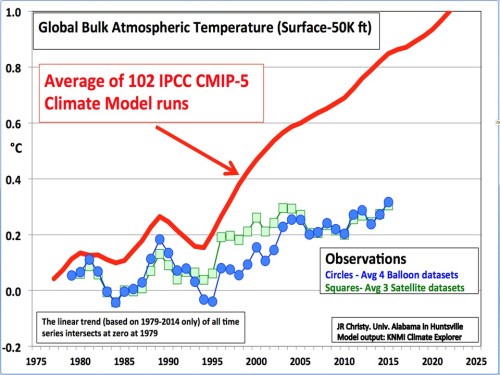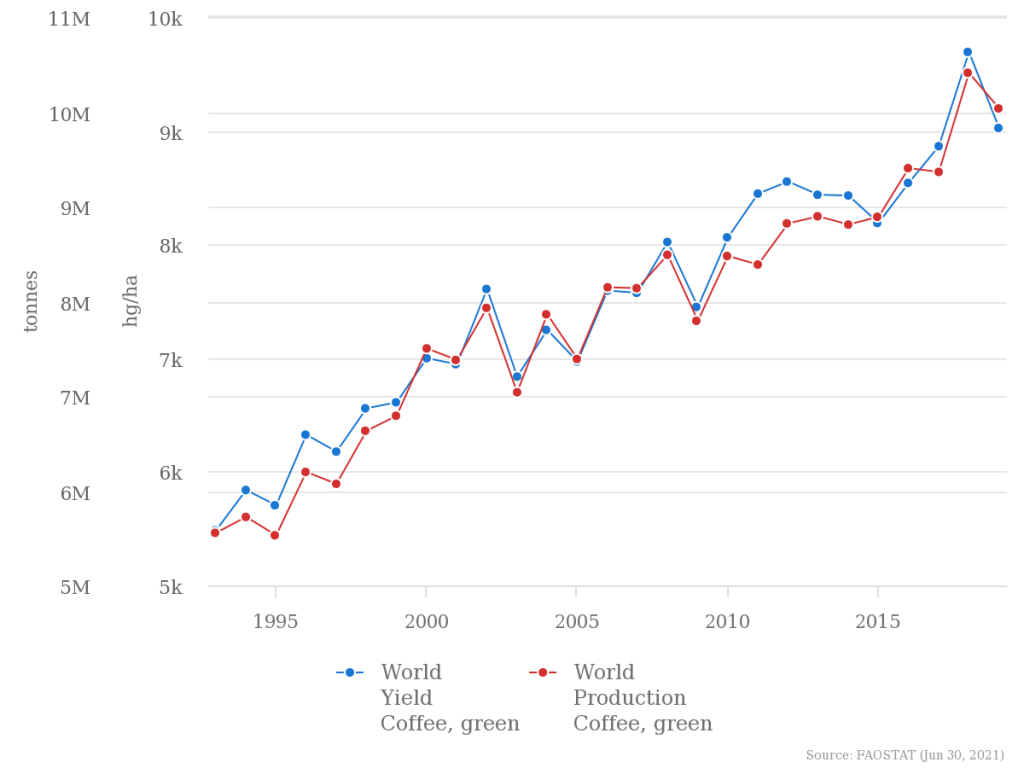An article in Fort Wayne Journal Gazette (credited to the Washington Post as the original source) highlighted by Google News today in a search for the term “climate change,” claims global warming is threatening a coffee crisis. This is false. Across its range, coffee production and yields per acre have been setting records with regularity during the recent period of modest warming.
The author of the article, titled “Climate change puts coffee at risk,” says the world’s coffee growers fear coffee production will suffer due to climate change, unless new varieties of coffee beans are developed.
“Climate change could spell disaster for coffee, a crop that requires specific temperatures to flourish and that is highly sensitive to a range of pests. So scientists are racing to develop more tenacious strains of one of the world’s most beloved beverages.
…
‘Coffee is not ready to adapt to climate change without help,’ said Doug Welsh, the vice president and roastmaster of Peet’s Coffee, which has invested in WCR’s research.”
Computer model projections of future temperatures are being used to gin up fear that coffee crops are threatened by modestly warmer temperatures. Yet, computer models are notorious for badly overstating actual temperatures [See Figure]1, and real world data show the earth’s modest warming has accompanied record coffee production and yields.

Coffee producers as a whole are not struggling. The U.N.’s Food and Agriculture Organization reports coffee production and yields nearly doubled between 1993 and 2019. Global coffee production increased from approximately 5.6 million tons in 1993 to more than 10.3 million tons in 2019. Indeed, FAO data show globally coffee set new records for both production and yield 12 times since 1993. The most recent records for production and yield were set in 2018. [See the figure below]

What’s true for the world as a whole is also true of the world’s top coffee producing countries. Brazil, Vietnam, Columbia, Indonesia, and Ethiopia (listed in order of production), have each experienced substantial growth in coffee production during the recent period of modest warming.
According to data from the Food and Agriculture Organization of the United Nations, from 1993 to 2019:
- Coffee production in Brazil grew by more than 135 percent;
- Coffee production in Vietnam increased by more than 1,137 percent;
- Coffee production in Columbia increased by more than 8 percent;
- Coffee production in Indonesia grew by more than 73 percent; and
- Coffee production in Ethiopia expanded by more than 168 percent.
The International Coffee Organization reports coffee producers face problems not from difficulty growing crops, but because crop conditions and crop production is so strong that supply is outpacing demand. Rapid growth in coffee crop yields are driving down coffee prices. In 2018/2019 coffee production grew by 3.7 percent overall, with Arabica bean production increasing by 1.8 percent and Robusta beans growing 6.7 percent. This marked the second consecutive year of declining prices amidst growing surpluses.
In the few areas within countries where farmers have ceased growing coffee and production has declined, the evidence indicates the reason is not poor climate conditions but rather increased international competition and low prices.
Sorry, to disabuse people of your climate alarm fairy tale, Fort Wayne Journal Gazette and Washington Post, but there is no climate/coffee crisis. Coffee production keeps growing as the Earth modestly warms.



















